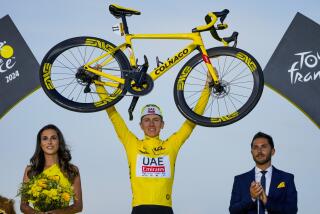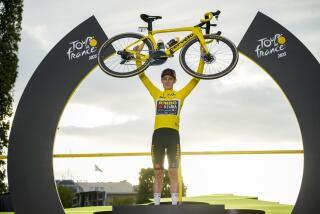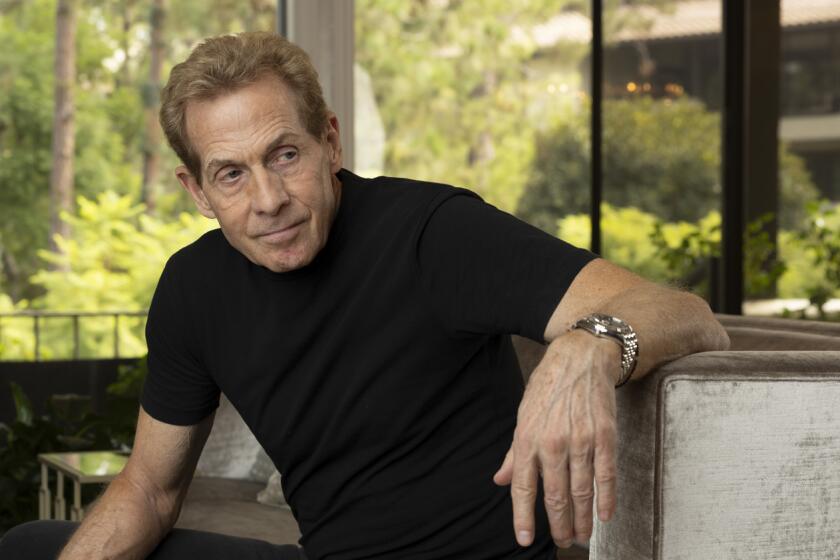Contador prevails in a questionable Tour
PARIS — Beleaguered to the verge of wretched, the Tour de France actually zoomed onto the Champs-Elysees Sunday and concluded per vivid tradition.
It kept sweeping by, enticing swells of cheers from those lining the boulevard five-deep. It wrought no apparent jeers.
Had you just arrived from solitary confinement, you might’ve presumed it just another majestic competition rather than one of sports’ most doping-addled events.
One cluster of men did carry protest signage. DEHORS TIBET, these monks pleaded.
Get out of Tibet.
Then, amid Norwegian flags and Australian flags and Colombian flags that celebrated various riders, the Tour de France announced an overall champion, 24-year-old Alberto Contador of Spain, who took the podium and grinned toothily with the Arc de Triomphe in the background.
A wavelet of cheers followed with nary a public mention of how the champion feted in 2006, Floyd Landis, tested positive four days later for testosterone.
“An extraordinary joy,” Contador said, as the Tour de France that made “Tour de Farce” a cliche concluded.
With its flunked doping tests of at least four cyclists -- including prerace favorite Alexander Vinokourov, late-stage leader and apparent winner-to-be Michael Rasmussen, and Cristian Moreni, whom the police hauled off -- the Tour may have invented a new paradigm for 21st-century sports-viewing.
People may deem an event a joke, yet watch anyway.
“Yeah, of course, we watch it,” Sebastian Lipszyc said. “We love it. Now it’s even more interesting. Is the funniest way to watch sport.”
He seems to have caught a wave with that. As of Friday, more than 500,000 Internet hits had clicked for the video of the Tour de France song he co-authored at La Plage Records of Paris. It’s called “EPO, Te Quiero” (“EPO, I Love You”), a satirical ode to EPO, the drug that heightens the blood’s oxygen-carrying capacity to unnatural levels. The song extols EPO for making the user “numero uno.”
A French government agency, unable to get the joke, refused its release as a CD, believing it espoused the use of EPO. La Plage then released it as a surreal video on various sites, with its Mexican singer surrounded by French accompaniment.
That this kind of viewpoint could amass such blithe interest doesn’t surprise Charles Yesalis, a Penn State epidemiologist. After three decades studying performance-enhancing drugs and taking many major sports “with a block of salt,” Yesalis said Friday he began to notice about eight to 10 years ago that his young students seemed blase about the matter.
They saw sports only as a sort of “cartoon with humans in it,” he said. They were “as nonplussed about drugs in sports as I was watching the Rolling Stones, with their drug use ... All the majesty of sports, it’s all” nonsense to them, he said, using a different word for “nonsense.” “They’re just viewing this as big entertainment now.”
He said, “The Tour de France has never been clean. It never will be clean,” with cheating “ingrained in the very heart of the culture of the sport.”
“So the joke still continues,” Lipszyc said.
“We think it’s funny,” he added, “because everybody knows” about the doping,” but “every year it’s the same.”
“People like the Tour because it’s very popular and part of the countryside,” he explained.
So as the race that is so emotionally tethered to France made its way toward Paris, the newspaper France Soir printed a mock obituary Friday declaring the traditional event dead at 104.
The French newspaper Liberation editorialized that the race had been “emptied of all sporting interest” and was “a caravan of ridicule.”
The Independent of London called it “a March of the Damned.” The French Prime Minister Francois Fillon noted “a disastrous image of the Tour de France.” Two German TV stations stopped airing the race, and one Swiss newspaper stopped printing its results except for those of doping tests.
A British cyclist, Bradley Wiggins, whose team exited when one of its members, Moreni, tested positive for testosterone, appeared at a news conference Friday in England and said: “The whole thing has just lost complete credibility as far as I’m concerned. No one’s got any faith in who’s wearing yellow [jersey] now.”
Added Wiggins: “The whole thing is null and void as far as I’m concerned this year.”
“EXCLU!” screamed the Thursday headline on the sports daily L’Equipe, after Denmark’s Rasmussen became the first rider in the 104-year event to get both the leader’s yellow jersey and banishment.
Rasmussen’s own team, Rabobank, banished him dramatically on Wednesday night, after it discerned that he’d fibbed about his whereabouts preceding the tour, telling the world his remote presence in Mexico had left him unable to submit to scheduled drug tests, where a witness spotted him in Italy.
Epitomizing the farce, Rasmussen won the mountainous 16th stage that day, riding through booing that he said enhanced his respect for Lance Armstrong, the American seven-time winner who often rode through public derision. Then Rasmussen claimed the booing owed to the frustration about the expulsion of Vinokourov, the Kazakh pre-Tour favorite who exited the previous day after testing positive for excessive erythrocytes, indicating a transfusion of somebody else’s blood.
“The only good there is to say about the Vinokourov case is that it proves that the system is working,” Rasmussen said Wednesday, “and to that I can only add that I’ve had 14 negative tests so far during this Tour.”
Five hours later, he too had received ouster.
One day after that, the misgivings touched young Contador himself, with his win in Thursday’s stage greeted by the manager of the rival AG2R team saying, “Contador’s performance is suspicious -- very suspicious. But we can’t say anything unless he’s caught in a doping check. I don’t trust this team. Maybe one day we’ll know.”
Another day passed, and then Contador finished a grueling time trial on Saturday, retained the leader’s yellow jersey, all but clinched the win, and he fielded an opening question involving a disgraced Spanish doctor whose list of 2006 clients included Contador’s name among more prominent names.
(Contador said his name had been cleared in the case.)
Suspicion finally engulfed this Tour de France after years of nibbling at others.
The 1998 race saw a towering scandal in which border agents arrested a helper with the Festina team with a carload of drugs.
From 1999 through 2005, the seven-time winner, Armstrong, faced serial charges of doping, especially after a French lab claimed a test in 2005 revealed EPO from a sample taken in 1999. The 2006 favorites, Jan Ullrich and Ivan Basso, missed the race in the cloud of an investigation of their doctor.
The 2006 winner, Landis, still awaits the outcome of his appeals on his positive tests for testosterone. In May, the 1996 winner, Bjarne Riis of Denmark, had given EPO its proper due for that surprising title and had his name officially deleted.
By last week, enough storm had materialized that Paul Kimmage saw something phenomenal.
Here’s the background: Kimmage, 45, cycled for Ireland in the 1984 Los Angeles Olympics and rode in the 1986 Tour de France, then became a journalist and wrote “Rough Ride,” a 1990 book that chronicled rampant doping in cycling. To many in the sport, including some journalists covering it, those chronicles qualified him for the pariah division.
Last Monday, Kimmage decided to drive the route of that day’s Tour stage from Foix to Loudenvielle, and when descending the fourth of the stage’s five climbs, he noticed a fan on the side of the road holding up a sign bearing just one word: KIMMAGE.
He pulled over to ask why.
“We feel like we’re fighting in the dark, and there’s nobody listening out there,” he said in a telephone interview. “The hypocrisy runs right through the sport from top to bottom, and that’s why it’s very hard for me to be optimistic.”
Yet, in just one sign of the times, a fan just wanted to thank him for speaking out so long ago.
“I was really, really touched by it,” Kimmage said.
--
(BEGIN TEXT OF INFOBOX)
Tour de France
Results from Stage 20, the final top 10 and the jersey winners for the 2007 Tour de France:
*--* STAGE 20 RESULTS 1. Daniele Bennati, Italy 3:51:03 2. Thor Hushovd, Norway same time 3. Erik Zabel, Germany same time 4. Robert Hunter, South Africa same time 5. Tom Boonen, Belgium same time
*--*
*--* FINAL STANDINGS 1. Alberto Contador, Spain 91:00:26 2. Cadel Evans, Australia :23 behind 3. Levi Leipheimer, U.S. :31 behind 4. Carlos Sastre, Spain 7:08 behind 5. Haimar Zubeldia, Spain 8:17 behind 6. Alejandro Valverde, Spain 11:37 behind 7. Kim Kirchen, Luxembourg 12:18 behind 8. Yaroslav Popovych, Ukraine 12:25 behind 9. Mikel Astarloza, Spain 14:14 behind 10. Oscar Pereiro, Spain 14:25 behind
*--*
*--* JERSEY WINNERS Yellow (overall) Contador Green (sprinters) Boonen Polka-dot (climbers) J.M. Soler, Colombia White (youth) Contador
*--*
More to Read
Go beyond the scoreboard
Get the latest on L.A.'s teams in the daily Sports Report newsletter.
You may occasionally receive promotional content from the Los Angeles Times.










